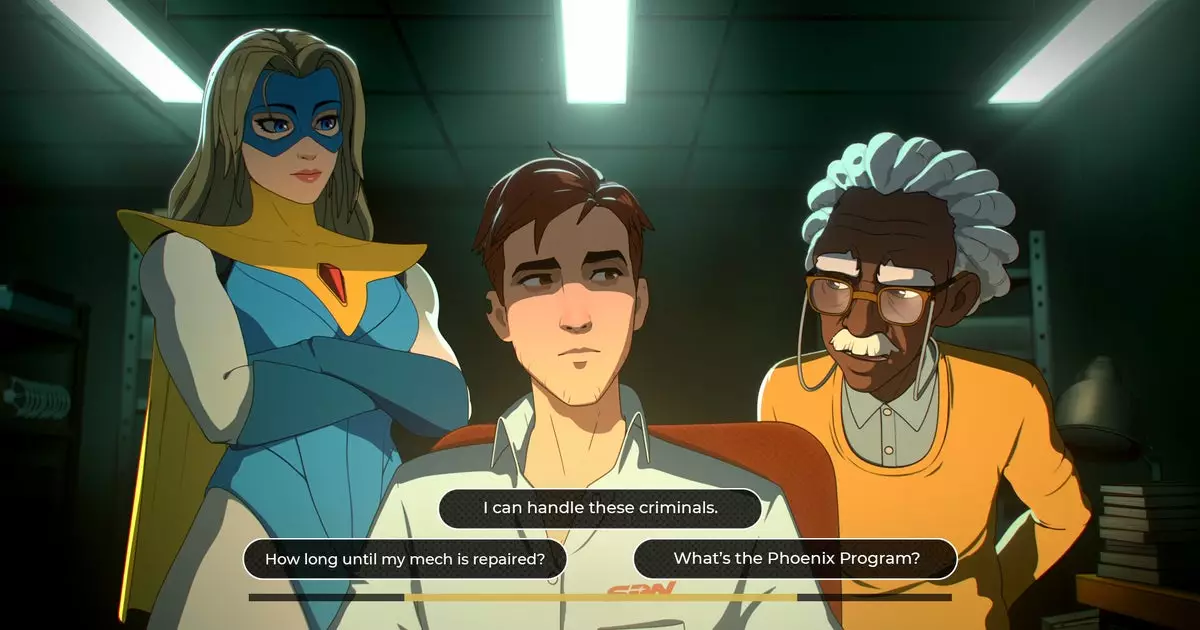Enter a world where the lines between heroism and villainy are delightfully blurred. “Dispatch” elevates the visual novel genre by blending narrative depth with light strategic gameplay, creating a captivating environment where players manage a ragtag team of reformed supervillains. The premise? Dispatch your team to handle quirky emergencies spiraling out of control in a vibrant town. The game is a delightful rollercoaster that brings together an ensemble of characters that promise both humor and chaos in equal measure.
A Cast of Eccentric Characters
What sets Dispatch apart is undoubtedly its character lineup. Here, players encounter a colorful cast that includes a fashion-conscious French assassin, a shapeshifting hero reminiscent of classic comic book tropes, and even a relatable golem who struggles with social interactions. Each character’s quirks add a layer of entertainment as they tackle ridiculous situations, such as rescuing a balloon or thwarting impromptu bank heists. Their witty banter, often delivered by a star-studded voice cast, enhances the comedic tone of the game while introducing players to their colorful personalities.
Actors like Aaron Paul, recognized for his role in *Breaking Bad*, lend their voices to the central character, a former hero now confined to a desk. Joining him are iconic voices like Jeffrey Wright and Laura Bailey, who further enrich the narrative experience. It’s impossible not to feel entertained by the dynamic interactions and improvisational spirit that ensue in each mission. The level of care that has gone into making these characters relatable is impressive, turning what could have been mere stereotypes into figures that players genuinely care about.
Humor and Heart: A Balancing Act
As players navigate through silly emergencies, the challenge of writing humorously without crossing any lines becomes paramount. “Dispatch” appears well-aware of this, tending to blend charm with caution. While the game does indulge in offbeat comedic styling, there is a persistent undercurrent of sensitivity woven into character backstories. These characters’ powers—often manifestations of their past traumas—imbue the narrative with layers, making it more than just a game about slapstick situations.
However, there is a tightrope to walk, and one can’t help but notice the shades of anxiety when exploring the delicate balance of humor involving series themes like neurodivergence or socioeconomic disparity. The witty repartees are sometimes tinged with a bit of darker humor, challenging players to ponder the implications of their interaction choices. While there’s much to applaud about the character-based storytelling, it does leave room for improvement, especially in ensuring that comedic elements do not overshadow genuine representation.
Visuals and Design: An Enriching Experience
Beyond the clever writing and unique character designs, Dispatch captivates players with its stylish visuals. AdHoc Studio has crafted an eye-catching aesthetic reminiscent of classic comics while maintaining a sleek modern touch. The animation is smooth and engaging, making each interaction feel lively and dynamic. The in-game scenes are meticulously directed, further enhancing the players’ immersion in nuances and storytelling.
Visually, the game captures the essence of every character’s individuality, from exaggerated expressions to unique abilities, giving each moment significance. The design choices complement the narrative flow, guiding players with visual cues that enrich gameplay and decision-making.
Replayability and Decision-Making
At its core, “Dispatch” offers players a rich playground to explore through choices that feel consequential. While the essence of a visual novel often leans on a linear narrative, “Dispatch” encourages multiple playthroughs with its layered decision-making system. Choices impact the outcomes of not only missions but also character relationships, fostering a sense of agency.
The game incorporates mechanisms reminiscent of other franchises’ systems, such as “X will remember that,” simmering a sense of accountability for players. As they navigate through highs and lows, their chosen paths shift the storyline’s trajectory, keeping the experience fresh and exciting.
Strongly pulling from the lessons learned by predecessors, “Dispatch” carefully sidesteps pitfalls that can diminish the impact of character-driven narratives. With every interaction laden with potential consequences, players are enticed to engage, re-engage, and perhaps uncover every nook and cranny of this whimsical world of reformed chaos.
Ultimately, “Dispatch” stands as a testament to the potential of storytelling in video games—combining humor with heart, chaos with camaraderie. In a landscape filled with formulaic narratives, it shines as a refreshing reminder of what makes gaming truly entertaining.

